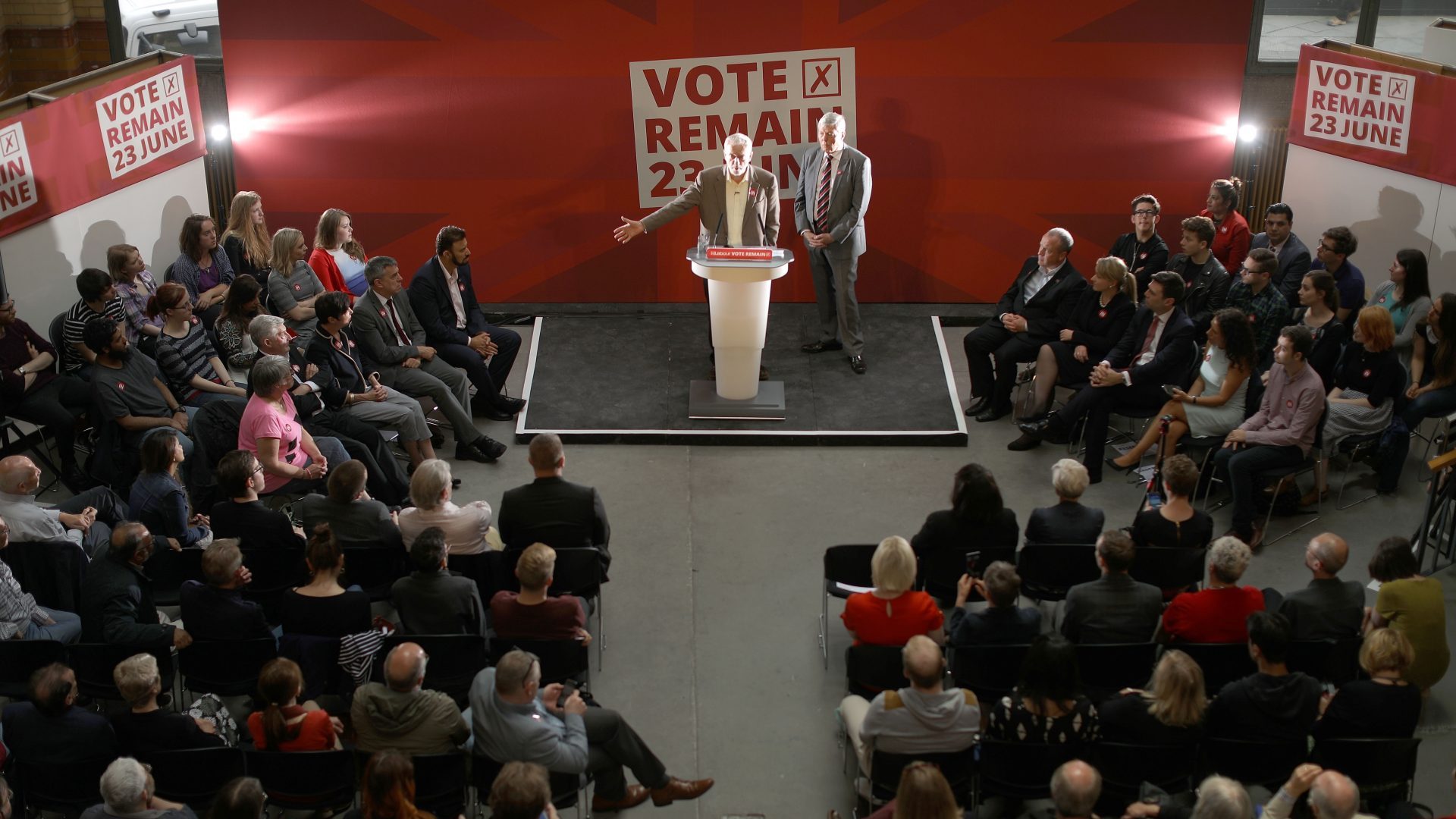Novels by politicians do not have an auspicious history. Benjamin Disraeli – the exception that proves the rule – aside, more recent history has given us Boris Johnson’s Seventy-Two Virgins, Nadine Dorries’ series of risible airport reads and Iain Duncan Smith’s The Devil’s Tune, a book that sold 18 copies on its week of release.
Alan Johnson, the Labour former home secretary among many other roles, was at least starting from a better position, having produced four critically and commercially successful volumes of his memoirs before releasing his debut novel, The Late Train to Gipsy Hill, last year. He has now released his second, One of Our Ministers is Missing. His publisher, he tells me via Zoom from his home in the East Riding, “would have had me churning out memoirs for all time”.
“I had qualms, you know, because it’s a huge challenge, but I did four memoirs – I was sick of writing about myself. I had these ideas for novels, and although the memoirs won me lots of awards, and I was very proud of that, I don’t think you can really call yourself a writer until you’ve developed plot and character and done all the things that I’ve loved reading.
“You need a challenge. Some people decide to sail around the world, some
people climb Mount Kilimanjaro – for me it was writing fiction. Could I do it? Could I make this imaginary world?”. The aforementioned Disraeli, he
points out, “was a fair fiction writer as prime minister”.
He talks with affection about his former English teacher, Peter Carling, to whom he dedicated the first volume of his memoirs. A keen writer of short
stories as a child, Johnson was encouraged by Carling to submit them to publishers and reminded him, as they were inevitably dismissed one by one, that all great writers could decorate their walls with rejection slips.
“The thing about Mr Carling, who I tracked down when I published This Boy, my first memoir, is I soon realised that this guy who’d introduced me to poetry, took kids to the theatre at his own expense, encouraged me to write,
got me reading Dickens and Arnold Bennett – he didn’t remember a single bloody thing about me.
“Why would he? He’s had thousands of kids coming through.”
His second novel is an entertaining police procedural thriller, not cliche-free (police are “the boys in blue”, a character drinking wine “gazes down at the pale gold liquid in her glass”), but a readable and satisfying page-turner.
Although it’s not (as the title may imply) a political work, there is some politics. Maybe, I say, I’m reading too much into it, but it’s telling that the
police in the book are all by and large good, decent people at a time when that notion is increasingly unfashionable on parts of the left.
“Basically the police, in my experience, are good, decent people,” he says. “They are fundamentally decent. And here’s something that probably you don’t hear very often, but what struck me about the police is that in every other sphere of society, if you had a privileged upbringing, and if you were a part of the kind of set that people like David Cameron were part of – I don’t blame him for that, he had as much control over the circumstances he was born into as I did – you always had an influence, the people you went to university with, the people who were in your club and all of that.
“And so you’ve always got someone to ring up, whether it’s health, or particularly in business, or whether it’s in the military… they haven’t got that in the police. There isn’t an officer class in the police. This is egalitarian. They come in on the beat and they have to be on the beat and work their way up. And all this nonsense about ‘that’s one of the problems with our police’ – that’s one of the great things about our police force.
“Peel’s original genius was not to have any military terms at all – no captains, no lieutenants, to make them citizens in uniform. I don’t think there’s been enough concentration on this as a kind of sociological issue, that the police, as they are in this country, are a really valuable reflection of society and you can, from a working-class background, become a copper and work your way up. You don’t need the old school tie and all that.”
Elsewhere, the minister of the book’s title, an obviously Cameroon-type peer with interests in the building industry, has a meeting with an elderly man in the East End of London whose refusal to sell his property is stalling a development. The minister lets slip that he voted Remain in the Brexit referendum. “I’m with Nigel now,” the man says.
It’s a shorthand way of describing the sort of working-class figure the minister is struggling to deal with – and an elegant way of pivoting the conversation to Johnson’s role as chair of the Labour In For Britain campaign in 2016.
Johnson is dismissive of the view that a Labour leader less lukewarm (or inwardly hostile) to the European Union than Jeremy Corbyn might have moved the dial.
“I’m not a Corbynite, as you might have guessed. And he had to be dragged kicking and screaming to do things, and other leaders would have done them,” he says. “But he realised, almost before he got his arse in the chair as leader of the opposition, we had a unanimous decision at conference. He realised that Labour, all the unions, were 100% in favour of Remain. And so you had this bit of sophistry he did. But, you know, he’s not an influential person. And it didn’t influence the outcome.
“This was David Cameron’s epitaph, if you like. I mean, he’ll go down probably like Lord North [the prime minister who lost America] as making the biggest error of any prime minister. And in the end we had, I think, 66% of Labour supporters – not Labour Party members, Labour supporters – voting to Remain, 66%. I think it could have been 76% with the kind of leader you’re talking about, without Corbyn. That wouldn’t have changed the dynamics, because Cameron only got, what, 30% of Tories voting for it. And the big thing that happened was the net migration statistics a month before the referendum.
“Here was Cameron, who’d promised to get net migration down to the tens of thousands, leading the campaign to remain in Europe and suddenly hit with a gift for Farage, you know? Cities the size of Newcastle, all this bollocks. In the end I was surprised it was only 52-48. Because they had everything going for them. Try standing on a doorstep explaining the importance of [Robert] Schuman and the great vision of Europe when the guy who comes behind you just says ‘take back control’.
“And this idea that Europe ran everything – I mean, I was a cabinet minister in five departments and I always say, there wasn’t a single day when a civil servant said to me ‘you can’t do that because of European legislation’. But that myth had taken hold. And ‘take back control’, along with the net migration figures and a bit around Turkey and all that, was a gift. Cameron’s decision just to have that referendum was just politically incomprehensible.”
Labour’s position under Sir Keir Starmer – a position that is the subject of much debate on the letters pages of this newspaper – is, says Johnson, still
influenced by the fact that “that feeling that Labour had deserted people hasn’t gone away”.
“It’s still there, still hanging about,” he says. “The idea of a People’s Vote was just ludicrous, as if the first vote had been conducted by robots. I mean, that was always going nowhere. And it was because of that that we refused to support Theresa May’s deal. I’ve got the deal up there, by the way.”
He points to a weighty tome on the bookshelf to his right. “That was a good deal. That was a 52-48 referendum result deal. Stayed in the customs union, no problem with Northern Ireland, stayed in lots of European institutions, out of free movement, which was the big issue… we should have supported that. Brave people like Caroline Flint were the only ones who stuck their heads above the parapet.
“And just imagine the turmoil we would have caused – if you’re really that kind of tribal – the turmoil we would have caused in the Conservative Party by Theresa May’s deal going through because of Labour support. I mean, it would have been glorious for us. But it was the right thing to do, because good people in Europe had sat down with us to negotiate this. Theresa May,
despite all her other faults, realised that this was a sensible compromise… the country would have been better off if we had had that deal. And now we end up in the worst of all worlds and [a] People’s Vote is about as far away as me going to Pluto.”
We speak as Starmer struggles to walk a tightrope on another issue – the party’s support or otherwise for striking workers. The Labour leader had urged shadow ministers to stay away from picket lines, sacking one, Sam Tarry (later clarifying it was for giving unauthorised media interviews). It all looks to be pointing towards a potentially difficult party conference in Liverpool later this month.
Johnson, a former general secretary of the Union of Communication Workers, has some sympathy.
“You have to look at the perspective of the leader of a political party that
wants to win the next election, not some kind of fringe group little cabal,”
he says. “A proper political party that’s looking to appeal to all the public. And looking to win seats in, you know, Gloucestershire as well as east Yorkshire.
“Of course you have to tread a fine line. Because people are going to be more and more upset about rail strikes etc. You can never win that kind of public argument. Where Labour leaders usually put it is ‘the right to strike’s important, this has to be resolved through negotiation, we’re not taking sides on this but we do urge the government to, you know, get the thing sorted out, refer it to Acas, whatever’. And that’s where Keir has to be.
“Where I am is absolutely 100% behind the strikers. I think there’s a generation of people now who realise that, actually, they don’t have to put up
with 10 years of austerity, no pay increases virtually at all, our pay falling behind, our defined benefit pension schemes gone. And how do you fight back? You don’t fight back on your own, the union has to do it.
“So I think particularly the RMT position, particularly with Mick Lynch, who I wouldn’t agree with on anything, certainly not Europe, but he’s posed this as ‘well, what else are we supposed to do?’. And so I am absolutely behind the unions, but I can say that. Keir Starmer probably is in the same position but can’t say it.”
Because Alan Johnson, in the second act of his life, is a writer now, not a politician. What’s next, I wonder? I say I could see One of Our Ministers is
Missing on ITV on Sunday nights, Gina McKee as the glamorous assistant Met commissioner.
“So can I,” he smiles. “Absolutely. If Hollywood want to call me, I’m available.”
One of Our Ministers is Missing by Alan Johnson is published by Hachette, £20




